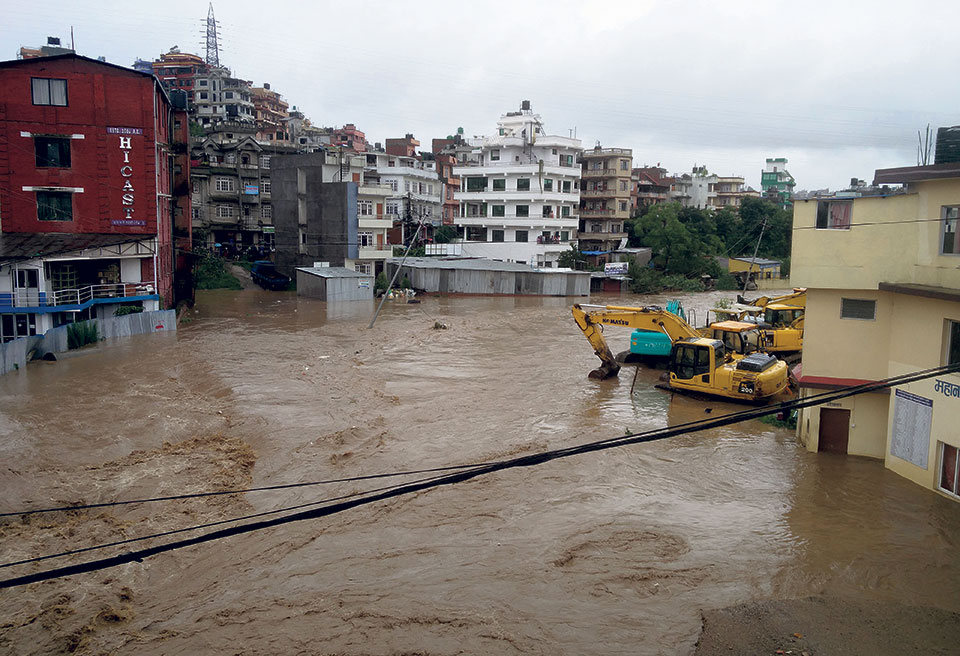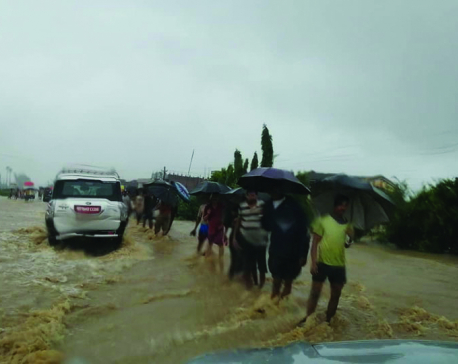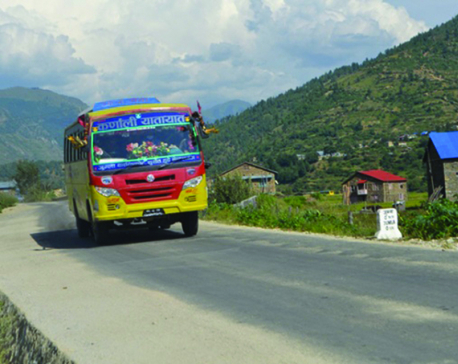
OR


Simone Galimberti
Simone Galimberti is the Co-Founder of ENGAGE, an NGO partnering with youths to promote social inclusion in Nepal.simone_engage@yahoo.com
During the disaster, Nepal can rely on a professional corps of volunteers, the first response teams composed by citizens from all the walks of life
The recent decision by the Government of Nepal not to seek foreign assistance in dealing with the floods that devastated large parts of the country should be seen in a positive way, not only as a reaffirmation of national confidence in dealing with national catastrophes but also a sign that the country is moving on from being donor-dependent. While accepting foreign support in situations of national disasters is not in itself a manifestation of weakness, even more developed countries, when needed, seek help when a calamity hits. However, it is positive to see that senior officers within the Central Disaster Management Committee are asserting their abilities to deal with the rescue and relief efforts in the aftermath of the recent floods that caused more than 80 causalities across the nation.
There are several ways for Nepal to better prepare for addressing the aftermath of natural emergencies. At the bottom we need to strengthen the local authorities that now have the powers and responsibilities to deal with natural emergencies. We also need to ensure that a strong central coordination mechanism exists at federal level in order to support all the phases of rescue and relief. Additionally, the government can seek help from neighboring countries within the South Asian Association of Regional Cooperation (SAARC). We can think of a three pillars strategy that relies on grassroots decision making and action, central level coordination and support and an extra layer of external backing, that could be activated whenever the circumstances require it, mainly through sharing of technical resources like rescue operation teams and the use of technical equipment, including the mobilization of appositely equipped airplanes and helicopters.
The cornerstone of such strategy should be centered on a voluntary-based rescue and relief corps of citizens that would be operating and administered locally but under common standards and procedures agreed by the federal government, the provinces and the municipalities and local and national security enforcement agencies.
Rely on locals
National Army, together with other security forces, is predominantly in charge of all types of major rescue and relief operations and they do it very professionally. Army’s resources, capabilities and expertise in dealing with post-disaster emergencies are undoubtedly a great asset for the country and no one wants to take away such responsibilities from them. Yet, they could greatly rely on a professional corps of volunteers, a sort of first response teams composed by citizens from all the walks of life, with a deep commitment toward local communities.
We all know that there are plenty of such persons throughout the country as we could see them in action in the aftermath of the big quakes few years ago and we know how indispensable they were. There are examples around the world of such volunteer-based emergency service whose tasks would be to support and compliment the work that is normally carried out by the security forces when a flood, a fire or a landslide or earthquake strikes.
Imagine such an emergency occurring in your community. Relying on a group of neighbors who are trained for such situations and act according to pre-defined standards and practices will offer a first and fast response that could alleviate, even if only temporarily, a natural emergency while army or police teams are deployed.
Such scenario will require a strong collaboration and coordination between citizens and locally elected authorities who must be fully in power of dealing with natural disasters based on clear procedures where the respective Provinces can intervene to help and where the federal government remains in standby through the Army and special allocation of resources, whenever extra support is required.
This implies a strong federal framework agreed between the centre, provinces and the municipalities with resources allocated accordingly. A hypothetical National Rescue and Relief Corps would be composed by citizens who voluntarily agree to undertake standard rescue and relief trainings and agree not to receive any sort of compensation for the duties they agree to provide in case of natural emergency.
They would act autonomously but under the strict supervision of and in coordination with the local emergency committees that are supposed to be active under the management of locally elected municipalities. Their autonomy is crucial because timely interventions are the most important lifesaving element of any rescue and relief operation.
After all, they would be locals who know the reality on the ground and they would be able to provide a first level of assistance, including first aid, to those who get most affected. Their volunteering nature is also fundamental: If it works outside Nepal and if it worked so well, even totally in an uncoordinated fashion during the big quakes, why not believe that there are out there committed citizens who are ready to get in action whenever an emergency calls?
After all while such corps could also be involved in awareness campaigns at school and community levels, we are not talking about a full-time duty experience. We could have rosters of citizens who undertake the standard mandatory training and agree to be on the call whenever something happens with more restricted number of volunteers agreeing to serve on regular basis for at least one extendable year.
Toward self-reliance
Setting up such a volunteering corps would require financial resources. This is true. But at the same time, the country is able to generate enough resources on its own to establish such first level of emergency response. In relation to the third pillar of a revamped natural emergencies response strategy, the one that foresees support within the region, the European Union has recently created a better and stronger emergency support system where member countries have agreed to pool together resources to respond to the gravest nature-caused challenges.
Such level of cooperation was not born out of the blue. It is based on years of informal mutual solidarity among the states of the Union. With political will, perhaps this could be a very practical and non-divisive tool that, setting aside the usual brinkmanship that is such a characteristic feature of South Asian regional politics, could be effective and useful not only to provide relief and supports to the citizens of the region but also boost a sense of togetherness among them. This is something that is so much needed in Nepal as well.
The author is the Co-Founder of ENGAGE, an NGO partnering with youths to promote social inclusion in Nepal
simone_engage@yahoo.com
You May Like This

Whither disaster preparedness?
Enforcing disaster preparedness is still a far cry in Nepal. Our efforts have been mostly focused on response. And response mechanism... Read More...

Economic case for road safety
If Nepal doesn’t act to reduce road injuries it might lose seven percent of GDP growth in the next two... Read More...

Tapping diaspora’s knowledge
Nepal should take a leap in scientific pursuit through mobilization of its large contingent of diaspora talent and scholarship ... Read More...







Just In
- NRB to provide collateral-free loans to foreign employment seekers
- NEB to publish Grade 12 results next week
- Body handover begins; Relatives remain dissatisfied with insurance, compensation amount
- NC defers its plan to join Koshi govt
- NRB to review microfinance loan interest rate
- 134 dead in floods and landslides since onset of monsoon this year
- Mahakali Irrigation Project sees only 22 percent physical progress in 18 years
- Singapore now holds world's most powerful passport; Nepal stays at 98th











Leave A Comment